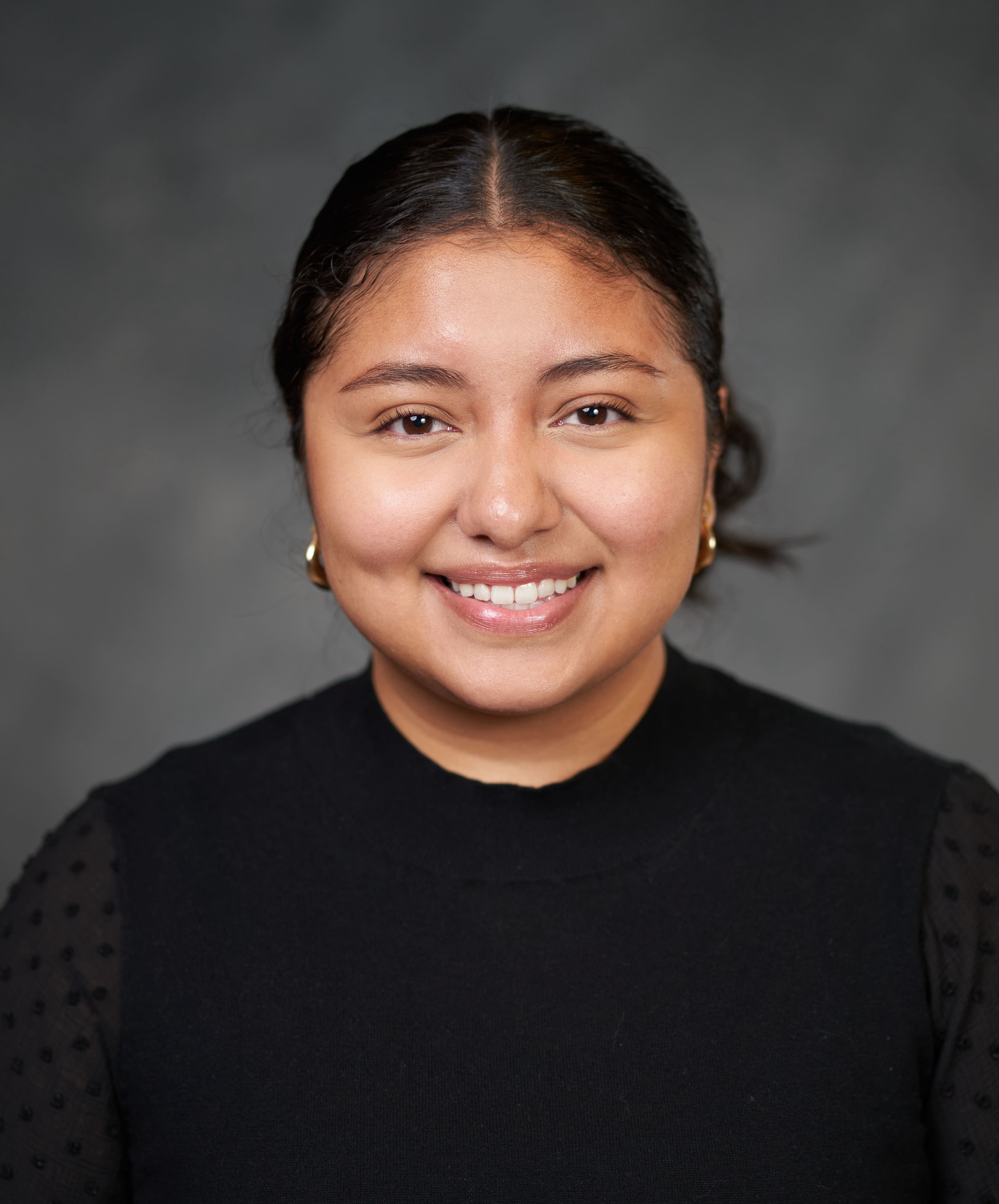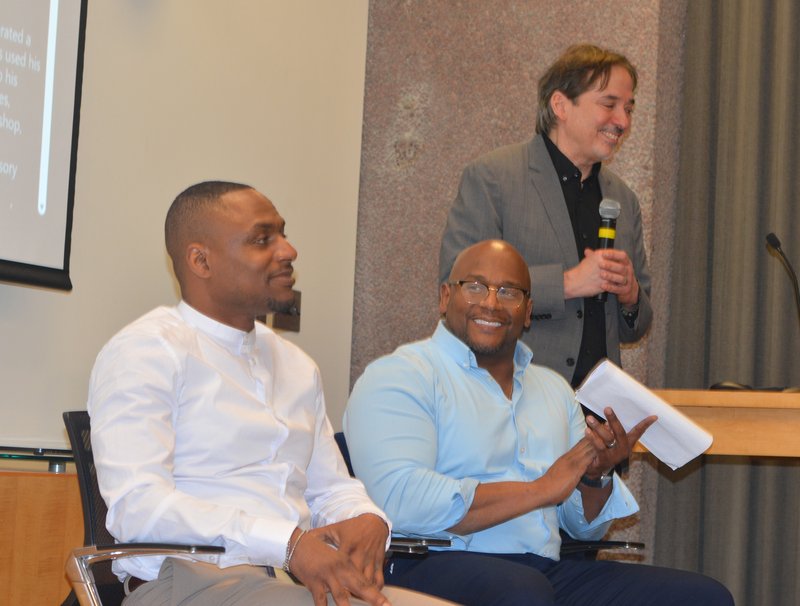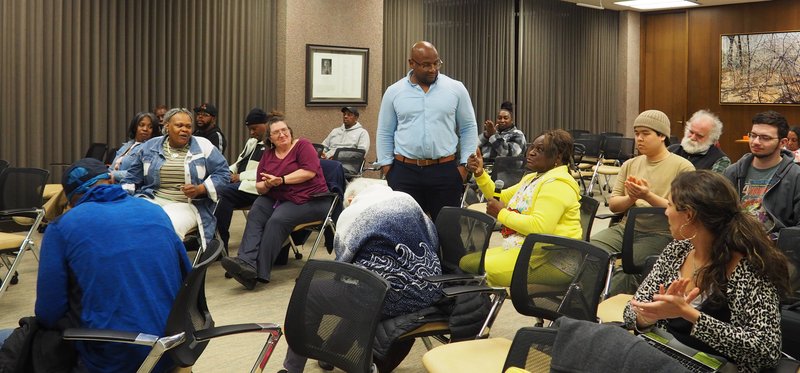
Editor’s Note: The following article was written by Kaylee Ramirez (pictured), a writing and rhetoric student in the College of Arts and Sciences, and information management and technology minor in the School of Information Studies. She is an editor for Mend, a publication centering people impacted by the criminal legal system.
When David Todd was released from prison after serving 21 years, he knew his experience as a returning citizen would be difficult. Yet he could not predict the challenges he would face living outside of prison. On Monday, March 24, the CNY Humanities Corridor’s Incarceration and Decarceration Working Group facilitated a dialogue between David Todd and advocate and writer Thomas Gant. The two discussed their experiences and the transformative role of writing and higher education both inside and beyond prison.
Patrick W. Berry, associate professor of writing and rhetoric in the College of Arts and Sciences and the founder of Project Mend, opened the event with remarks recognizing both speakers. Todd was a former student of Berry’s through the Education Justice Project, a multidimensional college-in-prison program based at the University of Illinois Urbana-Champaign. Reflecting on their connection, Berry shared, “It’s always great to see a student and their successes after they leave the university. This is especially impactful when the university is in prison.” Berry also collaborated with Gant, inviting him to speak at his Engaged Humanities Network course, WRT 413: Rhetoric and Ethics after Prison, last semester, where I was a student and had the opportunity to meet Gant for the first time.

David Todd, Thomas Gant and Patrick W. Berry.
During the talk, Todd and Gant reflected on the struggles of re-entering society after incarceration. Todd shared his personal challenges, from lost time with family to the difficulty of adapting to new technology. Similarly, Gant described the overwhelming pace of life after prison, saying, “Re-entering society is much like asking for water and someone turns on a fire hydrant and hands me a straw,” highlighting the speed and obstacles he faced.
Despite these challenges, Gant stressed the importance of family, peers and community in easing the transition back into society. However, he also highlighted the harsh reality that many formerly incarcerated individuals face with laws and systemic barriers that limit their ability to rebuild their lives and advance in society.
Todd then reflected on the transformative role that writing and education played in helping him rebuild his confidence. “Writing is one of the factors that boosted my confidence,” he shared. “I was able to express myself, and when I’m able to express myself, people start to listen to me.”

Thomas Gant taking questions from the audience.
Following the talk, participants took part in a writing workshop centered on speculative fiction, the genre highlighted in Nana Kwame Adjei-Brenyah’s Chain-Gang All Stars—a searing exploration of the American prison system and the meaning of freedom in this country.
Adjei-Brenyah, an alumni of Syracuse University, will be taking part in upcoming events in Syracuse associated with Environmental Storytelling CNY, a series of interconnected events, courses and programs facilitated by SU’s Engaged Humanities Network (EHN) and SUNY ESF’s Writing, Rhetoric, and Communications Program. On April 3, at 6 p.m., Adjei-Brenyah will offer a public reading at the Community Folk Art Center entitled “Dystopia Now.” On April 4, Adjei-Brenyah will work with representatives from Project Mend and Thomas Gant from the Center for Communication Alternatives to facilitate “Crafting Speculative Futures: A Fiction-Writing Workshop” at 10 a.m. at SUNY ESF. Additional information can be found on the Environmental Storytelling CNY website.
After learning more about Adjei-Brenyah and speculative fiction, participants were asked to identify a problem with our world as it is—one that they have experienced in their own lives—and create a story scenario that puts this problem at the center. Most focused on issues related to mass incarceration.
For Todd, the most important takeaway was seeing the humanity of returning citizens beyond the stigma of incarceration. “I want participants to understand that returning citizens are human and hopefully begin to remove the negative connotation that surrounds us,” he said. “I wanted to show them our humanity and what we go through.”
Gant, reflecting on what brought him back to Syracuse University, spoke about the power of students as future leaders. “This next generation here at Syracuse University, I believe, are leaders. So, I want to always be able to come back and impart what I know,” he shared. “If I could just tap into that passion and fire, I think the causes I fight for in advocacy would go much further. I know that there is power here, and SU rings bells across our country.”
Ilhy Gomez de Campos Rojas, an editor for Project Mend and EHN research assistant for Environmental Storytelling CNY, reflected on the event’s impact, emphasizing the transformative power of writing and education. “At Mend, we've often talked about how writing heals, and the importance of reading and writing to grow ourselves, and this event really solidified that,” he said. “We have to keep writing, and we have to keep learning, and we have to find ways to make that accessible to our communities.”
These events are made possible through collaboration with the Center for Community Alternatives and Project Mend. Additionally, the project has been supported at Syracuse University by the Engaged Humanities Network, the Humanities Center, the SOURCE, the Department of Writing Studies, Rhetoric and Composition, and a CUSE Research Grant.
